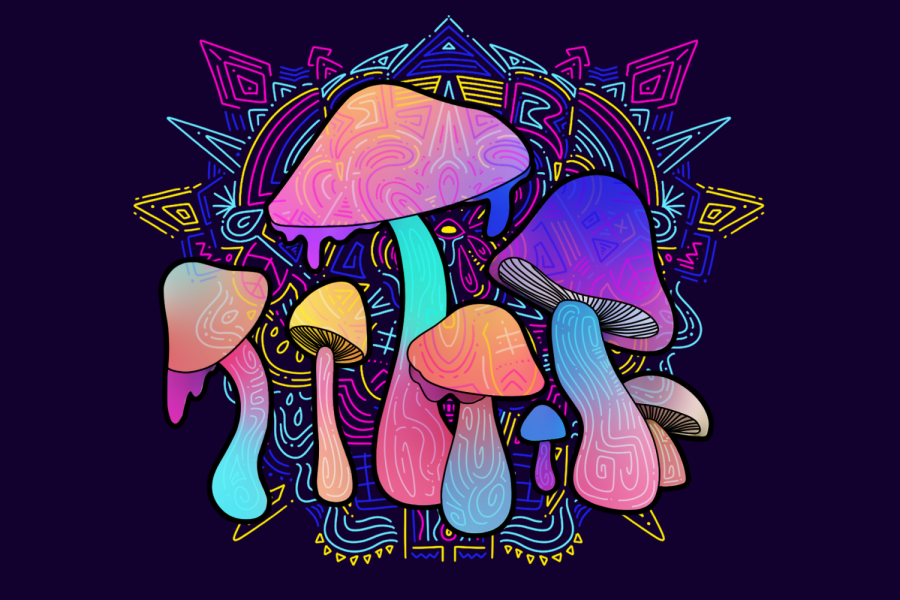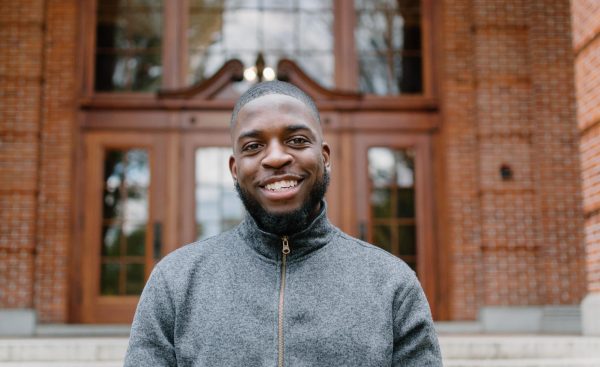What does new psilocybin-based services mean for Corvallis residents and the supposed mental health crisis?
Hallucinogenic mushrooms have been legalized in the state of Oregon as a result of Measure 109. This illustration shows a group of brightly colored and heavily patterned mushrooms.
February 7, 2023
Oregon cities and counties decide regulations for manufacturers, producers and servicers on psilocybin-based services, while at the beginning of 2023, the state announced that individuals can now pay and apply to become licensed for those services.
Psilocybin is a hallucinogenic alkaloid found in some toadstools, the spore-bearing body of a fungus. Psilocybin mushrooms refer to a group of fungi deriving from more than one common ancestor or ancestral group. Growing studies are suggesting a correlation between psilocybin use and improved mental health symptoms.
All producers, manufacturers, and service providers are required to be licensed through the Oregon Health Authority. Application fees range from $150-$500, with annual licensure fees ranging from $1,000-$10,000, depending on the license being applied for.
Although some counties don’t approve and plan to limit the service centers, Nancy Wyse, Benton County Commissioner, said that Benton-county had a 63% “yes” vote for legalizing psilocybin.
“We ended up going for time, place and manner regulations in Benton County versus referring it back to voters,” Wyse says.
Wyse claims that she and the county want to be proactive and get ahead of any potential issues that may happen. An important distinction to realize, she says, is that the city of Corvallis and Benton-county have their own time, place, and manner regulations, meaning they will be unincorporated.
The manufacture, production, and service zones will operate as follows:
- Growing the mushrooms will be limited to farm-use zones and multipurpose agricultural zones.
- Processing/manufacturing will be limited to exclusive farm-use, multipurpose agriculture zones, urban industrial zones, rural industrial zones, agricultural industrial zones, special-use airport industrial park zones.
- Service centers will be limited to conditional-use in the urban commercial, rural commercial and special-use airport industrial park zones.
Wyse said that she is not an advocate or a detractor for psilocybin, but she does believe that there is a mental health crisis.
Anita Cservenka, Ph.D. and associate professor of neuroscience who investigates neurocognitive functioning, claims that growing studies have suggested higher rates of widespread anxiety and depression. With these symptoms, especially, being true among young people.
“While depressive and anxiety symptoms often emerge during the adolescent years, I think the pandemic exacerbated existing mental health challenges, but also brought this [mental health] to the public’s attention more,” Cservenka said.
According to Cservenka, depression has been linked with lower hippocampal volume, which is a structure important for learning and memory consolidation. Although longitudinal studies have shown that individuals in remission have shown increased hippocampal volume relative to non-remitters, there are still differences between healthy individuals and those in remission.
“More long-term studies are needed to understand how much recovery in brain structure and/or function is possible and whether these also translate to symptom improvement,” Cservenka said.
Cservenka believes that it’s important to have early prevention and intervention studies, particularly for individuals who are at highest risk for developing the disorders themselves.
“There are decades of research suggesting the high rates of heritability (around 50%) for many psychiatric disorders including depression, and substance use disorders. This has been studied extensively for individuals with alcohol use disorder, as there is a strong familial link to this disorder,” Cservenka said.
There is growing interest in the research community to understand the benefits of psilocybin, and recent studies have suggested that there are benefits to psychedelics, like for people experiencing treatment-resistant depression, according to Cservenka.
As a veteran who served seven years in the army, Chris believes that psychedelics are important. He said that psilocybin has had a positive effect on his empathy and overall mental health. Although he’s not diagnosed with PTSD, he claims that his depression and anxiety was exacerbated by his army service.
“If your thoughts are a sled, and you’re going down a hill, eventually after all day of sledding down the hill, there’s a groove of ice that you can’t force the sled out of. Mushrooms are a fresh coat of snow,” Chris said. “It’s allowed me to work out problems, and be able to see from other people’s perspectives.”
Chris was born in Detroit, MI, where he was introduced to psilocybin by a friend at 18. He claims that he was a sheltered kid who grew up without a lot of sympathy in his life, but when he first tried psilocybin he knew it was important.
Chris said that he applied for the license to become a facilitator since that’s what he felt like his calling was. According to him, however, he was shunned away since he didn’t have a degree, and services will become obsolete in 10 years since psilocybin should be recreationally legal by then.
He and his wife felt like they had to move from Alabama, since his wife, another military vet, tested positive for marijuana and was threatened to be kicked off her veteren’s healthcare plan, according to him. After doctors gave her an ultimatum of getting clean or getting kicked off her medication, he said that they both made the decision to pack up and move to Corvallis.
“They wanted her to be a zombie,” Chris said. “They were treating side effects with other medications, to treat side effects to that medication.”
According to Chris, he doesn’t plan on using any psilocybin-based service centers when they arrive, since he feels that he doesn’t need them to that extent, but he does plan on growing his own psilocybin mushrooms.
















































































































